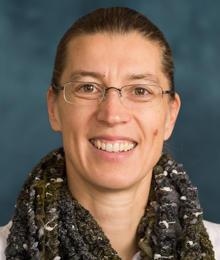An interview with Christiane Wobus
June 2020
Christiane Wobus is an Associate Professor at the University of Michigan and a member of the Microbiology Society. Her research focuses on the mechanisms of norovirus and astrovirus–host cell interactions and, in this interview, she tells us more about her ongoing research throughout the SARS-CoV-2 outbreak.

Tell us more about your research.
I am an Associate Professor in the Department of Microbiology and Immunology at the University of Michigan. I direct research on noroviruses and astroviruses, focusing on virus–host interactions, using transformed cell lines, human intestinal enteroids and mouse models. We have ongoing projects on how noroviruses modulate cellular metabolism in immune cells and the resulting consequences for pathogenesis, the host response to human astrovirus infection and astrovirus interaction with the intestinal epithelium. Given the ongoing pandemic of COVID-19, we are also studying SARS-CoV-2 in collaboration with other groups, to identify drugs with antiviral activity.
Why is your research important?
Research on SARS-CoV-2 is driven by current events. With vaccines many months away, we are working towards identifying drugs with antiviral activity that can be readily deployed to reduce COVID-19 disease.
Our work on enteric viruses is a long-standing interest of mine. Enteric pathogens cause significant morbidity, mortality and economic hardship worldwide. For example, human noroviruses (HNoVs) cause annual economic losses of around $60 billion in infection-associated costs worldwide, and around 21 million infections in the US alone. However, no direct treatment and prevention strategies are currently approved. To address this gap, we perform research on noroviruses, as well as astroviruses, another type of enteric virus that particularly affects the young and elderly. We aim to learn how these viruses infect cells and hijack the cellular machinery to replicate, in order to identify choke points that can be targeted by drugs. We are also interested in pathogenesis of the disease and the immune response to infection to develop effective vaccines. Thus, our process of fundamental discovery about virus biology is the first step in addressing public health needs.
What are the challenges you face in your work and how do you try to overcome them?
Science is moving at an astounding speed and new details about viruses are being revealed daily. Viruses are obligate intracellular pathogens and as such, rely on the host cell to replicate, but the host has an arsenal of defence mechanisms to limit infections. Thus, to better understand how viruses interact with their host, expertise from many areas in biology is required. In addition, new technologies are constantly being developed that enable even more detailed insights into virus biology. However, it is impossible to combine all of that expertise in one laboratory. Thus, we form collaborations that span disciplines and areas of expertise to uncover new knowledge and make meaningful contributions to the field.
Why is it important to be a member of an organisation like the Microbiology Society?
Being a member of the Microbiology Society and similar professional societies enables me to learn about new research, discover the expertise of other scientists, and build the network of collaborators necessary, to address the research questions at hand.
Why does microbiology matter?
With the COVID-19 pandemic affecting every country around the globe, it has become more evident than ever how important science and scientific discovery is for humankind. Scientists are racing to find ways to stop the spread of SARS-CoV-2. This pandemic has also reminded us that we live in a world full of microbes. Some of these can emerge at any time. Thus, studying microbes and developing ways to reduce or prevent infectious diseases are important for a functioning society in the 21st century.


